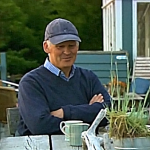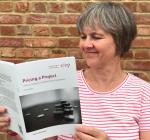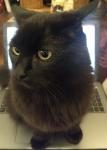All freelance careers start with tracking down that first client. Even the wise owls were chicks once (though probably still wise even then), and their experiences show that there isn’t just one way to go about getting that first paid project.
 Sue Littleford
Sue Littleford
I’ll talk about my early career, as my first clients came to me via a now-defunct route. It’s a long time since eBay had classified ads! I also picked up a couple of jobs through Gumtree. Two of my first actions on hanging out my shingle were joining SfEP and getting my website up and out there. My website brought in a few more clients who had found me courtesy of Mr Google – including a novelist I still work for some 12 years later. I also picked up a couple of jobs from what is now IM Available. But my big break was from answering an Announce that went to the whole of the membership (most go to just Advanced Professional and/or Professional Members) – I picked up my first packager client and that broadened my horizons and my experience hugely (which I promptly reflected in my CV). In the early days I also had an (expensive) ad in Yellow Pages, which I cancelled after two years as it was ineffective. But a few days before it was due to come off Yell’s website, a packager looking to hire only editors within the county found me (phew!). We did lots of work together over the ensuing years. I’d certainly advise not putting all your marketing eggs in one basket.
 Liz Jones
Liz Jones
My first client was the employer I’d just left – a non-fiction book packager. For a while I combined freelance project management (essentially continuing my old job) with working on small editorial jobs for them, alongside another major client (an educational publisher) secured via a former colleague. This all sounds too easy – and it was: it only deferred the inevitable need to find a range of clients, to mitigate the risk of working freelance. At first I suffered many sleepless nights: how would I pay my bills if the packager stopped using me? I realised I needed to take control, and worked hard to gain new work streams – in related areas via old colleagues, and also by ‘cold-emailing’ publishers and other potential clients. It took a couple of years, but I was so glad I put in the effort to market myself at that point. I felt more in charge of my career, and expanded into new areas of work. These days I still work for my first client, but only very occasionally, and I try never to be in the position of worrying about a single client dropping me. (Of course I still do all I can to retain my favourites!)
 Nik Prowse
Nik Prowse
I was forced to find my first client, because I was staring down the barrel of a 3-month redundancy notice. At the time I was working at home, but as an employee, as a staff editor for a science publisher. I needed a change, and redundancy (I realised later) was an opportunity. After deciding to go freelance I made a list of every science publisher I could think of and emailed my CV to commissioning editors, desk editors and managing editors, with the promise of following up by phone a few days later. Most approaches fell on deaf ears. A few turned into paid work in the long term. But two came up with immediate work. One was a European journal publisher offering a very low rate but frequent work. The other was a major university press. The person I’d emailed had a book to place, on molecular biology, and I could start on Monday 16 February 2004. Which was good timing, as I became redundant on Friday 13 February 2004 (very apt). So I finished the working week as an employee and started the next as a freelancer. It made me realise that many freelance opportunities are down to luck, but that you can make your own luck.
 Hazel Bird
Hazel Bird
My first ever piece of work as a freelancer paid £19.03 and took me six hours to complete, so I earned a princely £3.17 per hour. This was back in 2009. I was working full time as an in-house project manager for Elsevier, but I was also in the process of completing the Publishing Training Centre’s distance learning course in proofreading, and I wanted to take on some actual proofreading to keep my future options open.
The client was one of those agencies that arranges proofreading for students and academics. I believe I found them through a Google search for proofreading companies. I know that I completed a test, and I was then added to their list and offered work according to when I was available.
I worked for the agency for around eight months (I stopped after I left my job and began freelancing for my old employer). I worked up to completing around 2–4 articles per week, and by the end of the eight months I was regularly earning over £15 per hour, which I considered a good rate for someone of my experience. There were aspects of the work that weren’t ideal (such as having no contact with the authors and very little feedback), but it gave me a lot of relevant experience to help me upgrade my SfEP membership.
 Louise Bolotin*
Louise Bolotin*
My first job came from another, now retired, SfEP member. I had joined the society less than a fortnight earlier, but just in time to put my credentials in the next issue of the old Associates Available. My benefactor lived in my area and quickly got in touch to say she’d had an email from a marketing and comms company based somewhere between our two locations. They needed someone to work in-house for half a day to proofread some web copy. Did I want the job? Well, yes – of course! She passed my details to her contact at the company and the following week I found myself on a train to mid-Cheshire, where I spent several frustrating hours working for the comms company. Yup, it turned out to be a nightmare job and getting paid was also a hassle. But the point is, never underestimate the power of networking and getting your info in front of other people’s eyeballs. Despite plenty of experience, I’d only just returned to the UK after 13 years abroad and I had no contacts. I was very grateful for that first gig. Associates Available has been replaced by IM Available but is as useful as ever for picking up those early jobs that can help you start to build experience and a portfolio.
 Mike Faulkner
Mike Faulkner
This is how I found, not just my first, but my first dozen jobs – so I recommend it as a useful approach for all newbie proofreaders! The only qualification is that you need to be up for academic proofing.
There were three stages:
- I worked up a good understanding of the (quite strict) parameters for academic proofreading – in this context I mean dissertations and theses by undergraduates and post-grads, not papers by academics for publication.
- I went through my contacts – and my family’s and friends’ contacts – for anyone with any connection, even tangential, to university lecturers in any area with which I was comfortable (I concentrated on arts and particularly law), whether academics, journalists, current students or fairly recent graduates. I was interested in the names of lecturers/profs/supervisors who I might approach, and armed with those names and the courses they taught I got the relevant contact details from their institutions.
- I wrote a short, practical, helpful email to each person on the longlist, explaining my qualifications/training; my understanding of what is and is not acceptable in an academic context; how I might hopefully make their life easier (obviously you can’t say this last directly but it has to be implied, possibly with humour); and how swiftly I was able to turn work around.
My first job, for a Saudi student at Kings College London, came almost immediately and I have since worked on many papers by students of the same supervisor. Same for a number of other professors, so for work on which I was able to cut my teeth this approach was pretty successful.
*Louise Bolotin died in October 2022; her contributions are much missed.
SfEP Members can find out more about IM Available by visiting the Members’ Area on the SfEP website.
Photo credit: owl – Alexas_Fotos from Pixabay
Posted by Abi Saffrey, SfEP blog coordinator.
The views expressed here do not necessarily reflect those of the SfEP.


























